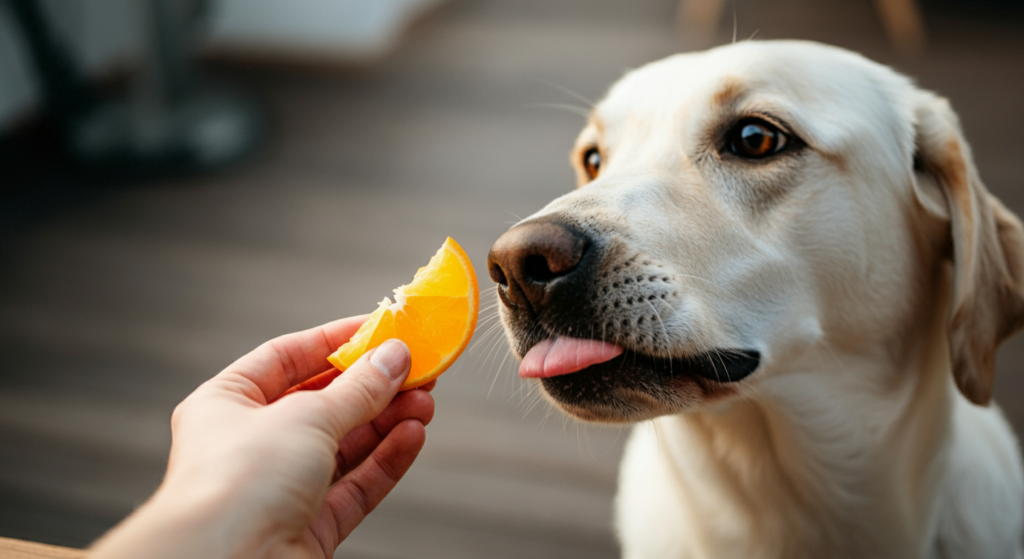Can dogs eat Oranges?
Can dogs eat Oranges? : A Juicy Treat or a Potential Risk?
As dog owners, we’re always on the lookout for foods that are safe and nutritious for our furry friends. With many human foods posing risks to dogs, it’s only natural to question what’s suitable for them. Oranges, the juicy and vitamin-packed citrus fruit, are a staple in many households. But when it comes to our canine companions, the question arises: “Can dogs eat oranges?” While they’re a refreshing and healthy snack for humans, it’s important to understand whether they’re safe for your pup. Being informed helps you make better choices when sharing food with your beloved pet.
Yes, dogs can eat oranges, but only under specific conditions. When served in small amounts and without seeds or peel, oranges are safe for dogs and may even provide some health benefits. However, moderation and proper preparation are key. Let’s dive deeper to ensure you’re making the best choice for your dog’s health.
Table of Contents

What Are Oranges?
Oranges are juicy, round fruits that come from citrus trees, originally cultivated in tropical and subtropical climates. They are rich in vitamin C, natural sugars, and dietary fibre. In human cuisine, oranges are often eaten fresh, juiced, or used as flavouring in various dishes and desserts.
For dogs, the natural sugar content and acidic nature of oranges require caution. Additionally, the peel and seeds can pose health risks, making it essential to understand how to safely prepare this fruit for your furry friend.
Can Dogs Eat Oranges?
The simple answer is yes, dogs can eat oranges, but only in moderation and under certain conditions. When served properly, oranges can be a refreshing treat with nutritional benefits.
However, not all parts of the orange are dog-friendly. Can dogs eat orange peels? No, the peel can be tough to digest and may cause gastrointestinal upset. Similarly, the seeds should be removed to avoid choking hazards or accidental ingestion of trace amounts of harmful compounds.
What Are the Benefits of Oranges for Dogs?
Oranges, when prepared correctly and offered in moderation, can provide certain benefits to your dog. While not essential to a dog’s diet, these fruits contain nutrients and compounds that may support your pet’s overall health. Here are some potential benefits:
- Rich in Vitamin C
Oranges are an excellent source of vitamin C, an antioxidant that helps boost the immune system and combat oxidative stress. While dogs naturally produce vitamin C, additional amounts can be beneficial during periods of stress or illness. - Hydration Support
Oranges are composed mostly of water, making them a hydrating snack on hot days. The natural moisture content can help replenish your dog’s fluids. - Dietary Fibre
The fibre in oranges supports healthy digestion and can help regulate bowel movements. However, too much fibre can lead to an upset stomach, so moderation is key. - Low-Calorie Treat
When served in small quantities, oranges can be a low-calorie, naturally sweet treat for dogs. They’re a healthier alternative to processed dog treats. - Contains Essential Nutrients
Oranges provide small amounts of nutrients such as:
- Potassium: Supports heart and muscle function.
- Calcium: Important for bone health.
- Folate: Aids in the production of healthy cells.
Are Oranges Bad for Dogs?
In moderation, oranges are not bad for dogs. However, excessive consumption or improper preparation can lead to issues such as digestive upset.
Are oranges bad for dogs if they’re served with the peel? Yes, the peel is difficult for dogs to digest and may contain residues of pesticides or wax. Always serve peeled, seedless orange segments to avoid these risks.
What Are the Dangers of Dogs Eating Oranges?
While oranges can offer some benefits, they also come with potential risks. Here are the key dangers:
- Digestive Upset
The natural sugars and acidity in oranges can cause stomach discomfort, especially if your dog consumes large quantities. Symptoms may include:
- Diarrhoea
- Vomiting
- Gas or bloating Tip: Introduce oranges gradually to monitor your dog’s tolerance.
- High Sugar Content
Oranges contain natural sugars that, in excess, can contribute to weight gain or exacerbate conditions like diabetes. Tip: Limit orange consumption and avoid offering them to dogs with pre-existing health conditions without consulting your vet. - Choking Hazards
Seeds and peel pieces can pose choking hazards, particularly for smaller dogs. They may also cause blockages in the digestive tract if ingested. Tip: Always remove seeds and peel before serving. - Toxic Residues on Peel
The orange peel may carry pesticide residues or artificial wax coatings, which can be harmful if ingested. Tip: Never let your dog eat orange peel. - Allergic Reactions
Though rare, some dogs may be allergic to oranges. Signs of an allergic reaction include:
- Itching or hives
- Swelling
- Difficulty breathing Tip: Introduce oranges slowly and monitor for any adverse reactions.

How Many Oranges Can Dogs Eat?
Portion control is crucial when feeding oranges to dogs. A few small segments are sufficient for most dogs. Large breeds may tolerate more, while smaller breeds should stick to one or two segments.
Tip: Use oranges as an occasional treat rather than a regular part of your dog’s diet.
Can puppies eat oranges?
Yes, puppies can eat oranges, but only in very small amounts. Their digestive systems are still developing, so it’s important to introduce oranges gradually and monitor for any adverse reactions, such as diarrhea or upset stomach. Always remove the peel and seeds before offering a small piece. Avoid overfeeding, as the natural sugars and acidity in oranges can be too much for a puppy’s sensitive stomach.
Fun Facts About Dogs and Oranges
- Some dogs love the tangy taste of oranges, while others may turn their noses up at the citrusy scent.
- Oranges are not a staple in canine diets but can serve as a fun, refreshing treat in moderation.
- Did you know? Oranges have been cultivated for thousands of years and were historically considered a luxury fruit.
Conclusion
So, can dogs eat oranges? The answer is yes—with precautions. Always serve peeled, seedless orange segments in moderation, and avoid giving your dog orange peel or excessive amounts of the fruit. As with any new food, consult your veterinarian if you’re unsure about introducing oranges into your dog’s diet. Remember, your dog’s health and safety come first. Have you tried giving your dog oranges? Share your experience below!

FAQ: Oranges and Dogs – What You Need to Know
1. Is an orange toxic to dogs?
No, oranges are not toxic to dogs. In moderation, they are generally safe and can even provide some health benefits. However, overfeeding or giving them certain parts like the peel or seeds can cause issues.
2. Can dogs eat oranges or mandarins?
Yes, dogs can eat oranges and mandarins in moderation. Both are safe for dogs if the peel, seeds, and excess sugar are avoided. Always introduce them gradually to see how your dog reacts.
3. What fruit can’t dogs eat?
Dogs should avoid grapes, raisins, cherries, avocados, and citrus fruits like lemons and limes due to potential toxicity or digestive upset. Always research a fruit before offering it to your dog.
4. Can dogs eat satsumas?
Yes, dogs can eat satsumas in small amounts. Like other citrus fruits, they are non-toxic but should be given without the peel or seeds to prevent digestive upset.
5. Can dogs eat orange peels?
No, orange peels are not safe for dogs. They are difficult to digest and can cause gastrointestinal blockages or discomfort. Always remove the peel before offering an orange to your dog.
6. Can dogs eat orange seeds?
No, orange seeds are not recommended for dogs. They may contain small amounts of harmful compounds and pose a choking hazard. Always remove seeds before sharing oranges.
7. Can dogs eat tangerines?
Yes, dogs can eat tangerines in moderation. Similar to oranges, they are safe if offered without the peel or seeds.
8. Can dogs eat mandarins?
Yes, mandarins are safe for dogs in small portions. Be sure to remove the peel and seeds to avoid digestive issues.
9. Can dogs eat clementines?
Yes, dogs can eat clementines. Like other citrus fruits, they should only be offered in small amounts and without the peel or seeds.
10. Can dogs eat orange juice?
No, orange juice is not recommended for dogs. It contains concentrated sugar and acidity, which can upset their stomach and contribute to weight gain. Fresh orange slices are a better option.
